You know, you don’t have to go as far as Milan or Verona for a bit of Tosca or La Bohème.
If you happen to find yourself in the Lost Valley in Co Cork - which is something of a natural amphitheatre just outside the bounds of the Muscraí Gaeltacht - you just might hear opera singer turned dairy farmer and cheese maker, Mike Parle, mid-aria.
“I don’t know if you know how loud it travels when you’re in the cheese room,” laughs his partner-in-life and farming, Darcie Mayland. “Mike likes the operas where tragic things happen.”
“That’s all of them,” deadpans Mike.
“But I guess there is some sort of synergy there with Irish farming,” Darcie observes wryly.
Mike and Darcie, along with their young son Ned, have been living on their farm near Inchigeela since 2017, where they established the award-winning Lost Valley dairy and creamery in 2020.
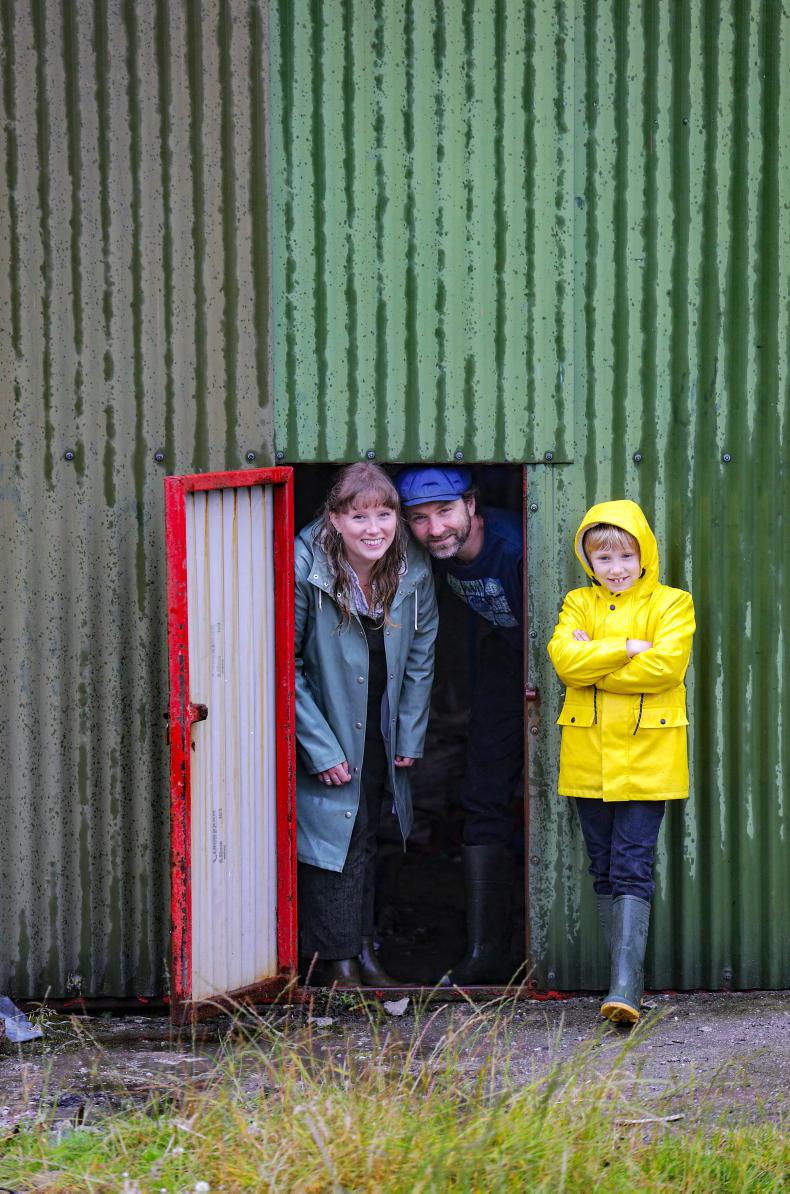
The Lost Valley Dairy is owned by Mike Parle, his partner Darcie Mayland and their son Ned. \ Valerie O’Sullivan
Originally from the UK - where Mike performed with Glyndebourne opera house, while Darcie worked as a restaurant manager - the couple had moved to East Cork (where Mike’s dad was born) in search of space and a slower pace of life in 2016.
“We’d started looking for somewhere to buy in England when Ned was about six months old and just found the whole thing very dispiriting,” explains Darcie. “We knew we wanted a little bit of land at the very least, that we didn’t just want to live in a terraced house, so we started thinking a little bit further afield.”
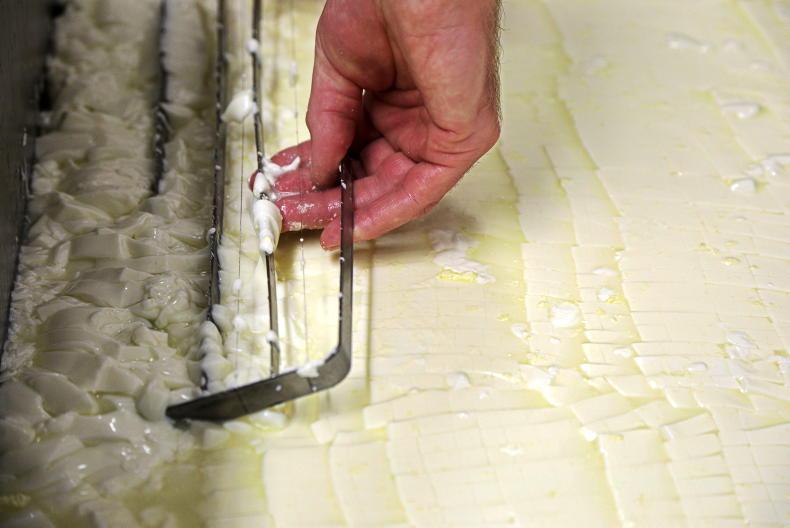
They produce their prize-winning raw milk cheese. \ Valerie O’Sullivan
Their search brought them to what had been part of a 190-acre beef and sheep farm in West Cork, where they bought the farm house and eight acres. But it wasn’t the plan to go farming full-time; or start a cheese-making business for that matter.
Back then, Darcie was managing Sage restaurant in Midleton when Mike - who was at home with Ned - decided to invest in a pedigree dairy shorthorn cow, Gertrude, in a self-sufficiency drive.
With more milk than they needed for themselves, however, he began to experiment with making butter, yoghurt and, crucially, cheese: though he learned how to do so in a less than traditional way.
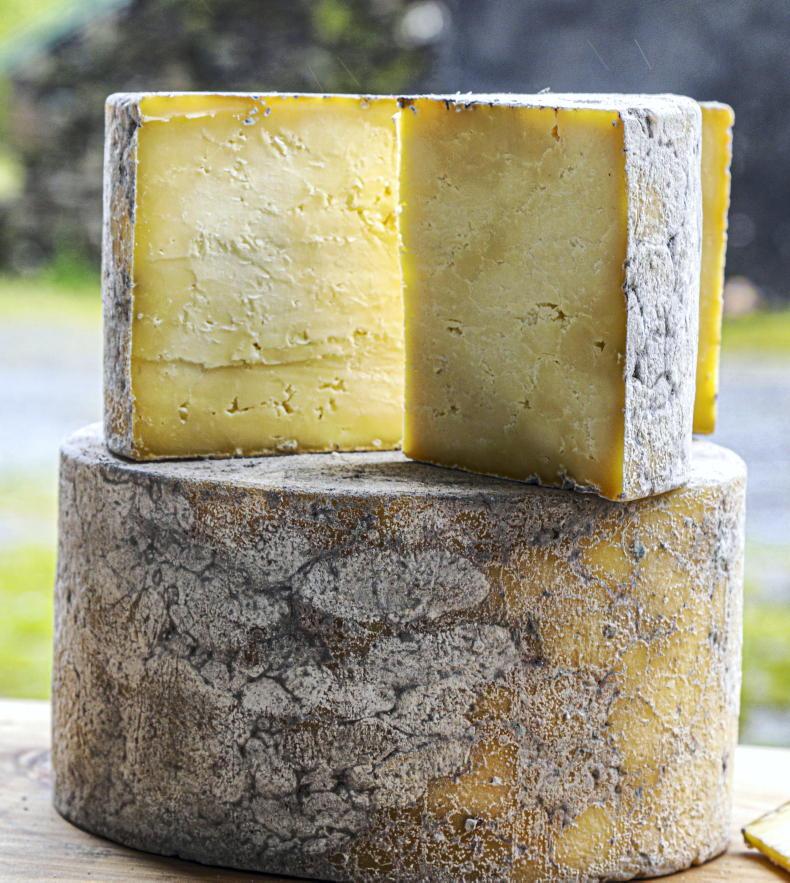
Lost Valley cheese is available from Skibbereen farmers' market and a number of independent shops. \ Valerie O’Sullivan
“I have a friend who knew quite a bit about cheese-making and he taught me via WhatsApp,” smiles Mike.
“WhatsApp voice notes!” clarifies Darcie.
A native cheese
Technology aside, the result was a traditional, tomme-style cheese; a cheese-making method originally perfected in the Alps, which Mike felt was the perfect vehicle for their West Cork raw milk, with little added except natural rennet and sea salt.
The result was christened “Carrignamuc”; an entirely new, native cheese.
“I wanted to sort of - in a small and modest way - invent a cheese,” says Mike.
“I haven’t invented a technique. There’s only a certain number of ways you can make cheese, but I wanted it to be unique. I didn’t have in mind how I wanted the cheese to be.
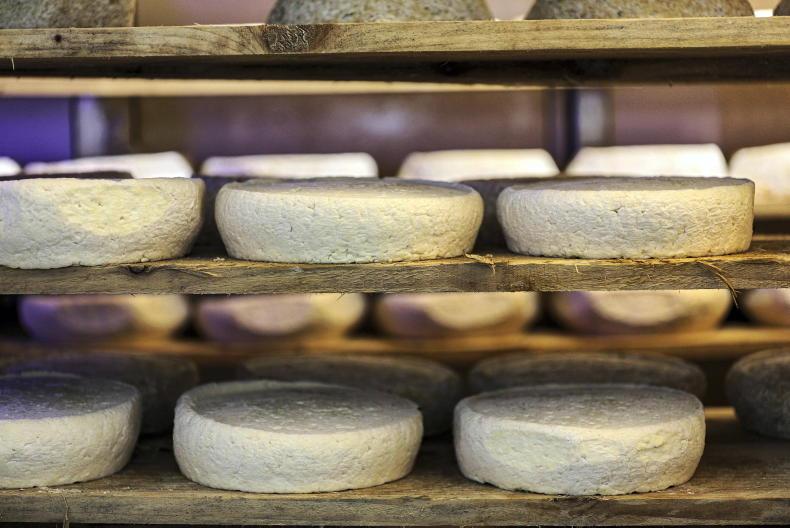
Their award-winning Carrignamuc is a new, native cheese. \ Valerie O’Sullivan
“I know it sounds silly, but I wanted the milk to turn into the cheese that it wanted to turn into. When you have raw milk, it’s trying to turn into cheese from the moment you put it in a pot!”
Part of what makes Carrignamuc unique is the fact that Mike isolates and develops his own starter culture (the bacteria that turns the milk into cheese), rather than using a freeze-dried culture. This means that the cheese also very much reflects the seasons and what is going on at the farm.
“So not only are you making a unique cheese to your situation, you’re making a unique cheese every time you make a batch of cheese,” says Mike.
“I started making earlier this year and the cheese was quite soft and slighted melted around the edge and had quite the preponderance of the Camembert type moulds and that’s due to what the cows are eating, but it’s also the weather, the temperature of the room, and then the weather affects what ripening bacterias there are. When it’s cold, there’s not much bacteria in the air, on the ground, wherever. When it’s warm, it’s going on everywhere.
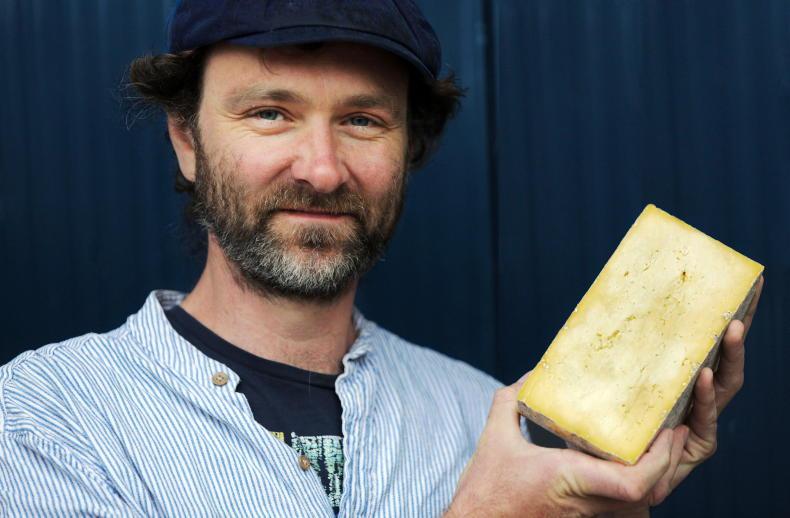
Mike Parle is a former opera singer turned farmer and cheese maker. \ Valerie O’Sullivan
“So the early cheeses are quite different from the summer cheeses and the autumn cheeses, the cows are making a little less milk, but the milk is richer and the curd becomes really strong and rich and the cheese is creamier and a little firmer, so you have to treat everything differently.”
Hobby to business
Pleased with the results, Mike and Darcie decided to pursue cheese-making as a business. They invested their savings in a shipping container that was already semi-kitted out for food production to make the cheese and received approval from their local environmental health officer. Meanwhile, their local enterprise office provided grant aid towards building an ageing room.
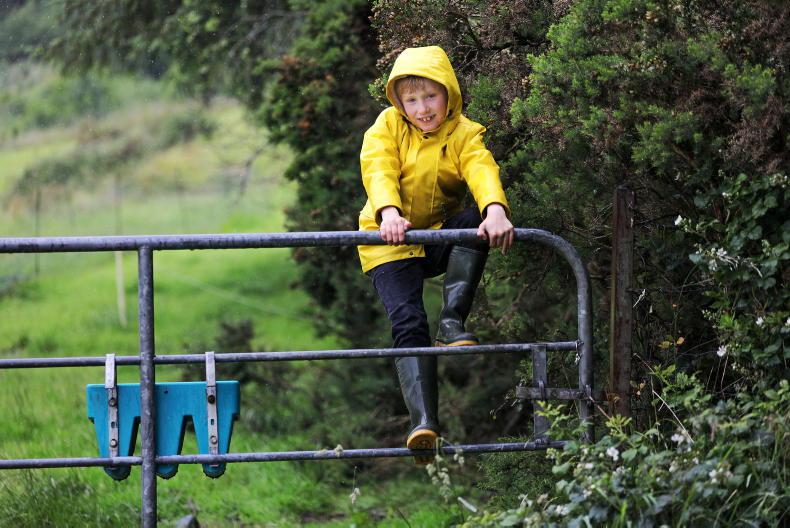
Son Ned has settled into west Cork farm life. \ Valerie O’Sullivan
With Darcie no longer working in the restaurant, they also applied for the back to work enterprise allowance, which meant they received 100% social welfare payment in the first year, and 75% the second year, so that any profits from cheese-making could be re-invested in The Lost Valley dairy.
“We wouldn’t have been able to do it without that for sure, because we’ve managed to just re-invest and re-invest,” says Darcie, who estimates that they have put in about €35,000 into the business to date.
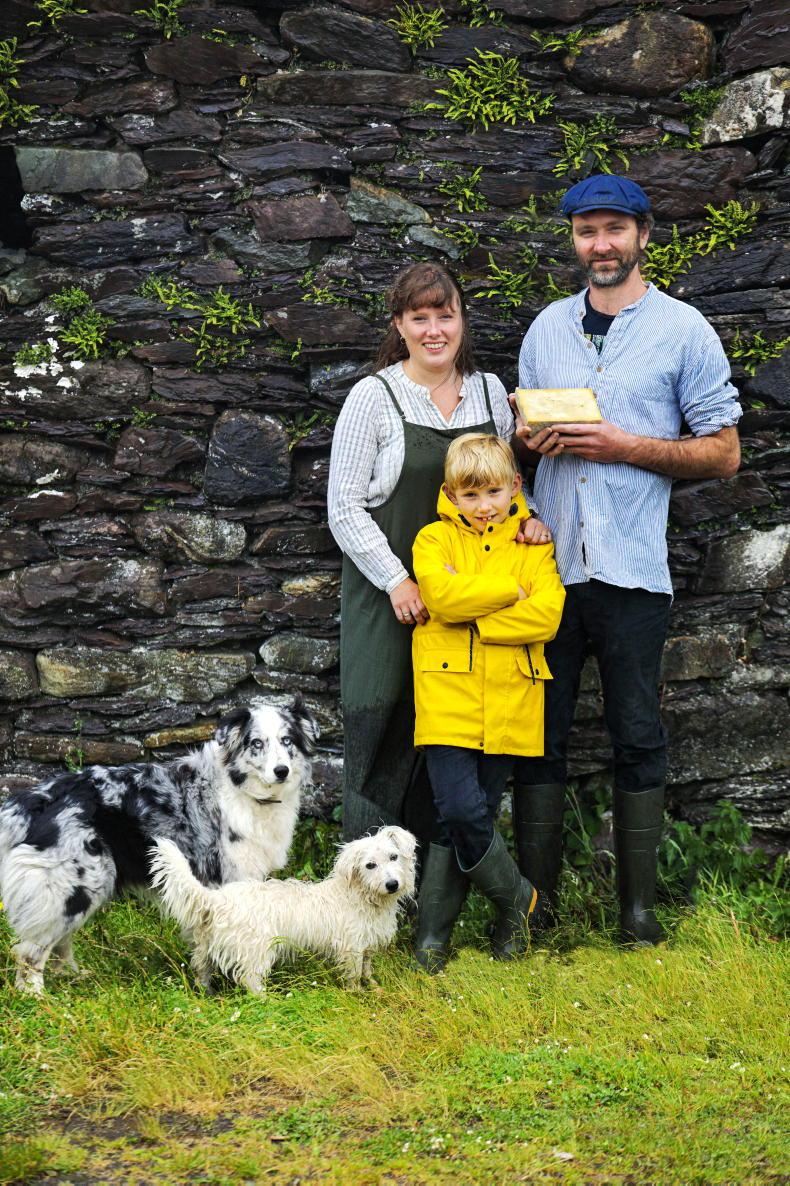
Mike and Darcie, along with their young son Ned, have been living on their farm near Inchigeela since 2017. \ Valerie O’Sullivan
Today, Mike is milking three shorthorns and one Droimeann cross cow- Kate, Tilda, Daisy and Freda- with a bucket milker, while Darcie focuses on sales and marketing. Originally, they planned to sell most of their cheese direct through the farmers’ markets, but while Darcie still attends Skibbereen market every Saturday, most sales are to shops including Mike’s Fancy Cheese in Belfast, Fields of Skibbereen, Loose Cannon in Dublin, Iago in Cork and Savoir Faire in Westport.
In addition to Carrignamuc- which won gold at the Irish Cheese Awards in 2021- The Lost Valley also produces limited quantities of a cheese they call “Rí na Mumhan”- similar to the strong-smelling French Munster cheese- and this summer, have launched their “Sobhriste” cheese, which is a milled curd cheese with wider appeal.
“It’s really nice having the Sobhriste on the stall because your customer who only eats cheddar will like it,” explains Darcie.
Challenges
The Sobhriste cheese is a new development in another respect too. Due to the size of the farm, Mike and Darcie can only keep four milking cows for their cheese. With a lack of land available for rent nearby, they decided to start buying in milk from a West Cork organic farm, to add to their own milk, to specifically make Sobhriste. If it is a success, this might signpost how they could expand. Currently, they are producing about 50 kilos a week of Carrignamuc, and 40 kilos of Sobhriste.
Despite the awards and the critical success, Mike and Darcie don’t wish to paint a rose-tinted view that they are living “the good life”. They find the bureaucracy around agriculture in general frustrating, and are concerned at the amount of inputs in the wider industry. Meanwhile, on their own farm, the decision to go chemical-free means that having enough grass for their herd is a constant challenge. The back to work enterprise allowance will end this year, so they will have to try to extend their milking season in order to make more money (they currently milk nine months of the year).
And…
“It’s basically really bloody hard work all day, every day,” states Mike.
“We don’t get into our beds at night and feel, ‘Oh we’re really winning at life!” laughs Darcie.
“I think we do everything the hard way,” continues Mike, “and nobody’s paying you to do things the right way.”
That said, they have no regrets. They speak warmly of the welcome they have received from other farming families in the valley, and how their son Ned especially has been embraced, attending the local Gaescoil and joining the football team.
“They [the locals] were really perplexed, but pleased that a young family was moving in because they were so used to people leaving for generations,” says Darcie.
And seeing as they get the odd opera recital as well, sure why wouldn’t the neighbours be happy?
Visit www.thelostvalleydairy.com
Read more
Farming and food meets art and community at The Barna Way
You know, you don’t have to go as far as Milan or Verona for a bit of Tosca or La Bohème.
If you happen to find yourself in the Lost Valley in Co Cork - which is something of a natural amphitheatre just outside the bounds of the Muscraí Gaeltacht - you just might hear opera singer turned dairy farmer and cheese maker, Mike Parle, mid-aria.
“I don’t know if you know how loud it travels when you’re in the cheese room,” laughs his partner-in-life and farming, Darcie Mayland. “Mike likes the operas where tragic things happen.”
“That’s all of them,” deadpans Mike.
“But I guess there is some sort of synergy there with Irish farming,” Darcie observes wryly.
Mike and Darcie, along with their young son Ned, have been living on their farm near Inchigeela since 2017, where they established the award-winning Lost Valley dairy and creamery in 2020.

The Lost Valley Dairy is owned by Mike Parle, his partner Darcie Mayland and their son Ned. \ Valerie O’Sullivan
Originally from the UK - where Mike performed with Glyndebourne opera house, while Darcie worked as a restaurant manager - the couple had moved to East Cork (where Mike’s dad was born) in search of space and a slower pace of life in 2016.
“We’d started looking for somewhere to buy in England when Ned was about six months old and just found the whole thing very dispiriting,” explains Darcie. “We knew we wanted a little bit of land at the very least, that we didn’t just want to live in a terraced house, so we started thinking a little bit further afield.”

They produce their prize-winning raw milk cheese. \ Valerie O’Sullivan
Their search brought them to what had been part of a 190-acre beef and sheep farm in West Cork, where they bought the farm house and eight acres. But it wasn’t the plan to go farming full-time; or start a cheese-making business for that matter.
Back then, Darcie was managing Sage restaurant in Midleton when Mike - who was at home with Ned - decided to invest in a pedigree dairy shorthorn cow, Gertrude, in a self-sufficiency drive.
With more milk than they needed for themselves, however, he began to experiment with making butter, yoghurt and, crucially, cheese: though he learned how to do so in a less than traditional way.

Lost Valley cheese is available from Skibbereen farmers' market and a number of independent shops. \ Valerie O’Sullivan
“I have a friend who knew quite a bit about cheese-making and he taught me via WhatsApp,” smiles Mike.
“WhatsApp voice notes!” clarifies Darcie.
A native cheese
Technology aside, the result was a traditional, tomme-style cheese; a cheese-making method originally perfected in the Alps, which Mike felt was the perfect vehicle for their West Cork raw milk, with little added except natural rennet and sea salt.
The result was christened “Carrignamuc”; an entirely new, native cheese.
“I wanted to sort of - in a small and modest way - invent a cheese,” says Mike.
“I haven’t invented a technique. There’s only a certain number of ways you can make cheese, but I wanted it to be unique. I didn’t have in mind how I wanted the cheese to be.

Their award-winning Carrignamuc is a new, native cheese. \ Valerie O’Sullivan
“I know it sounds silly, but I wanted the milk to turn into the cheese that it wanted to turn into. When you have raw milk, it’s trying to turn into cheese from the moment you put it in a pot!”
Part of what makes Carrignamuc unique is the fact that Mike isolates and develops his own starter culture (the bacteria that turns the milk into cheese), rather than using a freeze-dried culture. This means that the cheese also very much reflects the seasons and what is going on at the farm.
“So not only are you making a unique cheese to your situation, you’re making a unique cheese every time you make a batch of cheese,” says Mike.
“I started making earlier this year and the cheese was quite soft and slighted melted around the edge and had quite the preponderance of the Camembert type moulds and that’s due to what the cows are eating, but it’s also the weather, the temperature of the room, and then the weather affects what ripening bacterias there are. When it’s cold, there’s not much bacteria in the air, on the ground, wherever. When it’s warm, it’s going on everywhere.

Mike Parle is a former opera singer turned farmer and cheese maker. \ Valerie O’Sullivan
“So the early cheeses are quite different from the summer cheeses and the autumn cheeses, the cows are making a little less milk, but the milk is richer and the curd becomes really strong and rich and the cheese is creamier and a little firmer, so you have to treat everything differently.”
Hobby to business
Pleased with the results, Mike and Darcie decided to pursue cheese-making as a business. They invested their savings in a shipping container that was already semi-kitted out for food production to make the cheese and received approval from their local environmental health officer. Meanwhile, their local enterprise office provided grant aid towards building an ageing room.

Son Ned has settled into west Cork farm life. \ Valerie O’Sullivan
With Darcie no longer working in the restaurant, they also applied for the back to work enterprise allowance, which meant they received 100% social welfare payment in the first year, and 75% the second year, so that any profits from cheese-making could be re-invested in The Lost Valley dairy.
“We wouldn’t have been able to do it without that for sure, because we’ve managed to just re-invest and re-invest,” says Darcie, who estimates that they have put in about €35,000 into the business to date.

Mike and Darcie, along with their young son Ned, have been living on their farm near Inchigeela since 2017. \ Valerie O’Sullivan
Today, Mike is milking three shorthorns and one Droimeann cross cow- Kate, Tilda, Daisy and Freda- with a bucket milker, while Darcie focuses on sales and marketing. Originally, they planned to sell most of their cheese direct through the farmers’ markets, but while Darcie still attends Skibbereen market every Saturday, most sales are to shops including Mike’s Fancy Cheese in Belfast, Fields of Skibbereen, Loose Cannon in Dublin, Iago in Cork and Savoir Faire in Westport.
In addition to Carrignamuc- which won gold at the Irish Cheese Awards in 2021- The Lost Valley also produces limited quantities of a cheese they call “Rí na Mumhan”- similar to the strong-smelling French Munster cheese- and this summer, have launched their “Sobhriste” cheese, which is a milled curd cheese with wider appeal.
“It’s really nice having the Sobhriste on the stall because your customer who only eats cheddar will like it,” explains Darcie.
Challenges
The Sobhriste cheese is a new development in another respect too. Due to the size of the farm, Mike and Darcie can only keep four milking cows for their cheese. With a lack of land available for rent nearby, they decided to start buying in milk from a West Cork organic farm, to add to their own milk, to specifically make Sobhriste. If it is a success, this might signpost how they could expand. Currently, they are producing about 50 kilos a week of Carrignamuc, and 40 kilos of Sobhriste.
Despite the awards and the critical success, Mike and Darcie don’t wish to paint a rose-tinted view that they are living “the good life”. They find the bureaucracy around agriculture in general frustrating, and are concerned at the amount of inputs in the wider industry. Meanwhile, on their own farm, the decision to go chemical-free means that having enough grass for their herd is a constant challenge. The back to work enterprise allowance will end this year, so they will have to try to extend their milking season in order to make more money (they currently milk nine months of the year).
And…
“It’s basically really bloody hard work all day, every day,” states Mike.
“We don’t get into our beds at night and feel, ‘Oh we’re really winning at life!” laughs Darcie.
“I think we do everything the hard way,” continues Mike, “and nobody’s paying you to do things the right way.”
That said, they have no regrets. They speak warmly of the welcome they have received from other farming families in the valley, and how their son Ned especially has been embraced, attending the local Gaescoil and joining the football team.
“They [the locals] were really perplexed, but pleased that a young family was moving in because they were so used to people leaving for generations,” says Darcie.
And seeing as they get the odd opera recital as well, sure why wouldn’t the neighbours be happy?
Visit www.thelostvalleydairy.com
Read more
Farming and food meets art and community at The Barna Way












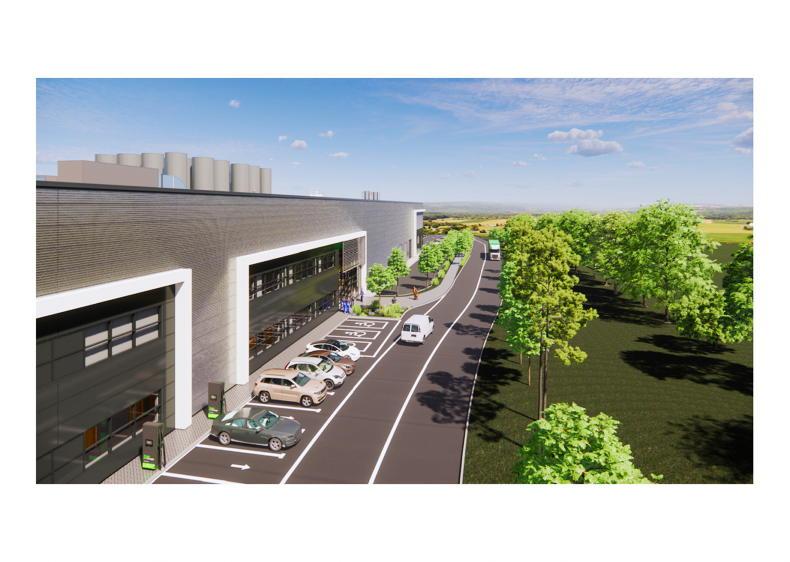
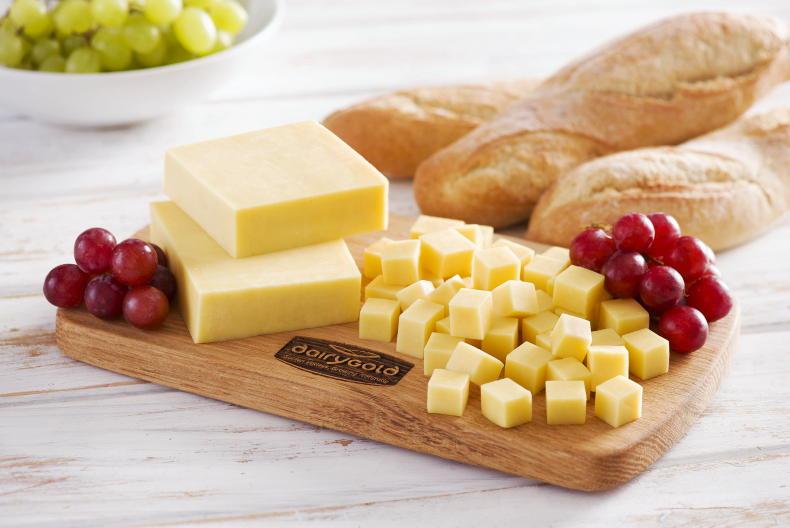
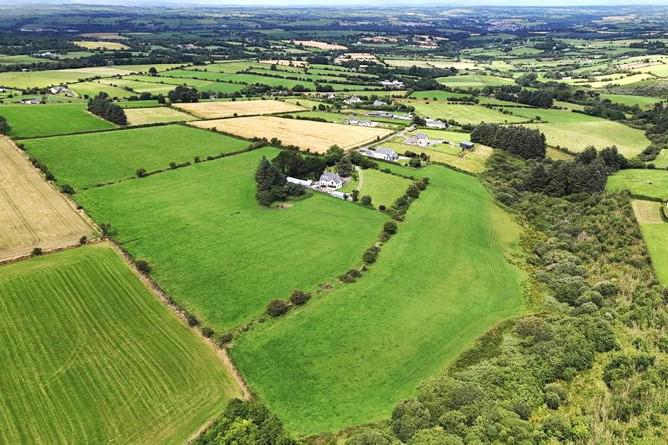

SHARING OPTIONS